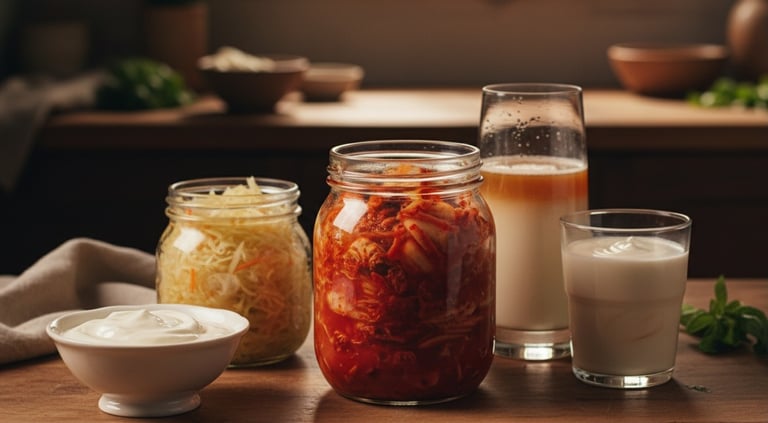FREE AI Analytics Tool for Health Reports and Scans available.
Kimchi, Kombucha, & Kefir: How Fermented Foods Boost Your Health
Discover the science behind fermented foods like Kimchi, Sauerkraut, Yogurt, Kombucha, & Kefir. Learn how these probiotic powerhouses support a healthy gut, reduce inflammation, and improve nutrient absorption.
HEALTHY RECIPES
11/13/20253 min read


The Ancient Secret to a Modern Gut Revolution
Have you ever opened a jar of sauerkraut and wondered how something so simple and sour could possibly be a "superfood"? Or maybe you've tried to brew your own fizzy, vinegary kombucha and felt like a culinary mad scientist. You’re not alone. Fermented foods—from Korean Kimchi (김치) to the bubbly tea known as Kombucha—feel trendy right now, but they're not new. They are, in fact, an ancient secret to preservation and health that our ancestors knew well.
Think about the last time you had a minor stomach ache. Did you reach for yogurt, or perhaps some pickled vegetables? The growing interest in gut health has made foods like these superstars, but why? It all comes down to a process we call fermentation, which is less about preserving food and more about turbo-charging it with beneficial, living bacteria.
What’s the Magic Behind Fermentation?
At its simplest, fermentation is a natural process where microorganisms—like bacteria and yeast—convert carbohydrates (sugars and starches) into acids or alcohol. In the process, they create:
Probiotics: These are the live, beneficial bacteria that help populate your gut microbiome.
Enhanced Nutrients: The process breaks down complex compounds, making vitamins and minerals easier for your body to absorb (a process called nutrient bioavailability).
Postbiotics: The healthful metabolic byproducts of fermentation (like short-chain fatty acids) that directly interact with your immune cells and gut lining.
It’s truly a win-win: the food is preserved, and its nutritional profile gets a significant upgrade.
A small personal anecdote: I remember my grandmother, who grew up eating traditional pickled vegetables, always saying, "A sour bite is a good bite." She didn't know the science, but she knew those fermented foods kept her feeling strong. Our ancestors knew instinctively that these foods were alive and good for them!
The Power Players: From Yogurt to Kimchi
While there are hundreds of fermented foods globally (like Miso and Tempeh), here are the superstars leading the modern health charge:
1. Yogurt (The Ubiquitous Starter)
Yogurt is the most common fermented dairy product, made by adding two specific types of bacteria (Lactobacillus bulgaricus and Streptococcus thermophilus) to milk.
Benefit: Highly accessible and a great introduction to probiotics. It’s a good source of calcium and protein, and the fermentation process makes the lactose easier to digest for many people.
Data Point: According to a 2024 report by the Dairy Council, daily yogurt consumption has been linked to better management of blood pressure and reduced risk factors for Type 2 Diabetes (Source: American Journal of Clinical Nutrition, 2024).
2. Sauerkraut (The Simple Cabbage Cure)
Sauerkraut is simply finely shredded cabbage fermented by lactic acid bacteria. It’s perhaps the simplest and oldest fermented food still widely consumed.
Benefit: Sauerkraut is a fantastic source of vitamin C and K. When eaten raw (unpasteurized), it delivers powerful probiotics and has been shown to improve digestion.
3. Kimchi (The Spicy Gut Booster)
Kimchi, the national dish of Korea, is typically made from fermented cabbage and radishes. It’s an excellent source of probiotics and vitamins.
Benefit: The ingredients are high in fiber (a prebiotic), which feeds the beneficial bacteria Lactobacillus already in your gut.
Data Point: A 2024 review found that regular consumption of fermented foods, including kimchi, was associated with an increase in overall gut microbial diversity and a decrease in levels of 19 inflammatory proteins in the body (Source: Cedars-Sinai research/ZOE Ferment Study, 2025).
4. Kombucha (The Fizzy Detox)
Kombucha is a sweetened tea fermented by a SCOBY. It has a slightly tart, acidic, and bubbly profile.
Benefit: Known for its content of organic acids (like acetic acid) which can help support digestion and liver function.
5. Kefir (The Diverse Dairy Dynamo)
Kefir is a cultured milk drink that's often thicker than yogurt. It is made by fermenting milk with "kefir grains."
Benefit: Kefir typically contains a more diverse and potent spectrum of microbial strains than most yogurt, making it a powerhouse for seeding the gut.
Data Point: A small 2023 clinical trial in Ireland found that a combination of fermented foods and prebiotic fibers reduced perceived stress in adults by 31% (Source: Journal of Psychiatry and Neuroscience via ZOE, 2025), highlighting the impact of the gut-brain axis.
Easy Steps to Ferment Your Diet
Ready to start feeding your microbiome? Here are a few simple ways to integrate these powerhouses:
Start Small: Begin with a spoonful of plain, unpasteurized sauerkraut or a small cup of plain kefir or yogurt daily.
Swap Your Soda: Replace one sugary beverage with a low-sugar, fruit-flavored kombucha.
Use as a Condiment: Add a side of kimchi or sauerkraut to your scrambled eggs, sandwiches, or rice bowls. It's a flavor bomb and a gut bomb!
Read the Label: Look for the words "live and active cultures" or "unpasteurized" to ensure the beneficial microbes haven't been killed by heat processing.
Embracing fermented foods isn't a diet; it's a way to honor the microscopic community inside you. Give your gut a little love, and your whole body will thank you.
What's your favorite fermented food? Share your secret recipe or your go-to brand in the comments below!
Disclaimer: This article is for informational purposes only and does not constitute professional advice. Consult with a healthcare professional before making significant dietary changes.

Address
Blk 8 Cantonment Close
SIngapore